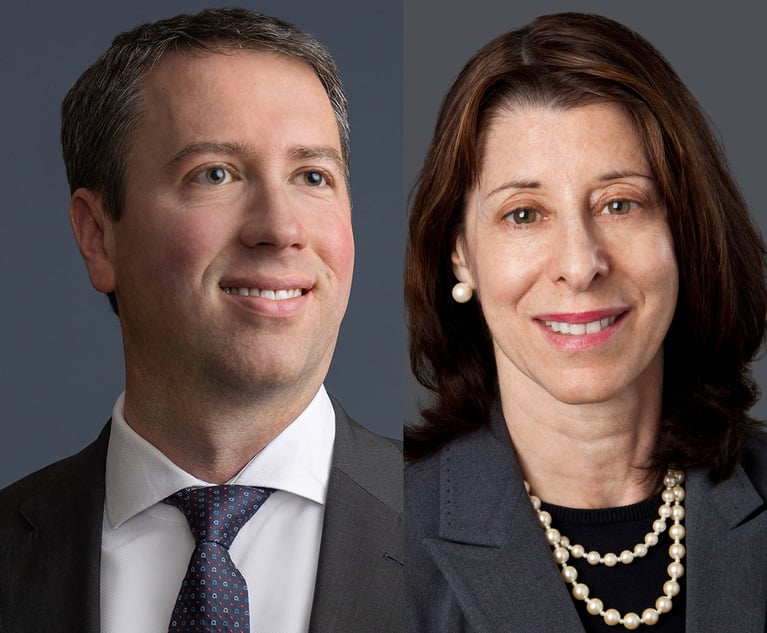The Odonata Case: Trusts, Escrows and Property of the Estate (or Not) Part II
To avoid property held in "escrow" from becoming part of the bankruptcy estate of a depositor, creditors must be aware of state law governing the creation of escrow accounts and pay attention to the logistics of such accounts to ensure they conform with such law.
July 31, 2024 at 02:23 PM
9 minute read
Analysis Adam Wolk, left, and Barbara Goodstein, right, of Mayer Brown. Courtesy photos
Adam Wolk, left, and Barbara Goodstein, right, of Mayer Brown. Courtesy photos
Introduction
In February, this column discussed a new state law proposed by the Uniform Law Commission, namely the Uniform Special Deposits Act (the "USDA" or the "act"). The act seeks to eliminate inconsistent treatment across states of structures, such as trusts and escrows, intended to insulate deposit account assets from the risk of the depositor's bankruptcy.
A recent New York case, In re Odonata Ltd., 658 B.R. 62 (Bankr. S.D.N.Y. 2024), held that funds deposited in a purported escrow account were in fact not exempt from being considered "property of the estate." This decision articulates better than most the requirements, at least under New York law, for escrow accounts (see the discussion in our column "Trusts, Escrows and Property of the Estate (or Not)," 269 N.Y.L.J. 109 (June 2023)). It also emphasizes the need for a uniform solution for these and similar structures that is workable across state lines. Today, we discuss the Odonata case and the benefits of a uniform statute on these issues.
Factual Background
In re Odonata Ltd. involved a dispute between Odonata Ltd. ("Odonata"), the owner and operator of a hair salon operating under the name "Cowlicks Japan," which leased space from Baja 137 LLC ("Baja"). In 2021, Odonata and Baja engaged in negotiations to modify and extend Baja's lease, which led to a proposed lease amendment. Odonata executed the proposed lease and sent it to Baja for signature, but Baja refused to sign the amendment, citing change in circumstances, and requesting better terms.
This content has been archived. It is available through our partners, LexisNexis® and Bloomberg Law.
To view this content, please continue to their sites.
Not a Lexis Subscriber?
Subscribe Now
Not a Bloomberg Law Subscriber?
Subscribe Now
NOT FOR REPRINT
© 2025 ALM Global, LLC, All Rights Reserved. Request academic re-use from www.copyright.com. All other uses, submit a request to [email protected]. For more information visit Asset & Logo Licensing.
You Might Like
View All


Judgment of Partition and Sale Vacated for Failure To Comply With Heirs Act: This Week in Scott Mollen’s Realty Law Digest
Law Firms Mentioned
Trending Stories
- 1Uber Files RICO Suit Against Plaintiff-Side Firms Alleging Fraudulent Injury Claims
- 2The Law Firm Disrupted: Scrutinizing the Elephant More Than the Mouse
- 3Inherent Diminished Value Damages Unavailable to 3rd-Party Claimants, Court Says
- 4Pa. Defense Firm Sued by Client Over Ex-Eagles Player's $43.5M Med Mal Win
- 5Losses Mount at Morris Manning, but Departing Ex-Chair Stays Bullish About His Old Firm's Future
Who Got The Work
J. Brugh Lower of Gibbons has entered an appearance for industrial equipment supplier Devco Corporation in a pending trademark infringement lawsuit. The suit, accusing the defendant of selling knock-off Graco products, was filed Dec. 18 in New Jersey District Court by Rivkin Radler on behalf of Graco Inc. and Graco Minnesota. The case, assigned to U.S. District Judge Zahid N. Quraishi, is 3:24-cv-11294, Graco Inc. et al v. Devco Corporation.
Who Got The Work
Rebecca Maller-Stein and Kent A. Yalowitz of Arnold & Porter Kaye Scholer have entered their appearances for Hanaco Venture Capital and its executives, Lior Prosor and David Frankel, in a pending securities lawsuit. The action, filed on Dec. 24 in New York Southern District Court by Zell, Aron & Co. on behalf of Goldeneye Advisors, accuses the defendants of negligently and fraudulently managing the plaintiff's $1 million investment. The case, assigned to U.S. District Judge Vernon S. Broderick, is 1:24-cv-09918, Goldeneye Advisors, LLC v. Hanaco Venture Capital, Ltd. et al.
Who Got The Work
Attorneys from A&O Shearman has stepped in as defense counsel for Toronto-Dominion Bank and other defendants in a pending securities class action. The suit, filed Dec. 11 in New York Southern District Court by Bleichmar Fonti & Auld, accuses the defendants of concealing the bank's 'pervasive' deficiencies in regards to its compliance with the Bank Secrecy Act and the quality of its anti-money laundering controls. The case, assigned to U.S. District Judge Arun Subramanian, is 1:24-cv-09445, Gonzalez v. The Toronto-Dominion Bank et al.
Who Got The Work
Crown Castle International, a Pennsylvania company providing shared communications infrastructure, has turned to Luke D. Wolf of Gordon Rees Scully Mansukhani to fend off a pending breach-of-contract lawsuit. The court action, filed Nov. 25 in Michigan Eastern District Court by Hooper Hathaway PC on behalf of The Town Residences LLC, accuses Crown Castle of failing to transfer approximately $30,000 in utility payments from T-Mobile in breach of a roof-top lease and assignment agreement. The case, assigned to U.S. District Judge Susan K. Declercq, is 2:24-cv-13131, The Town Residences LLC v. T-Mobile US, Inc. et al.
Who Got The Work
Wilfred P. Coronato and Daniel M. Schwartz of McCarter & English have stepped in as defense counsel to Electrolux Home Products Inc. in a pending product liability lawsuit. The court action, filed Nov. 26 in New York Eastern District Court by Poulos Lopiccolo PC and Nagel Rice LLP on behalf of David Stern, alleges that the defendant's refrigerators’ drawers and shelving repeatedly break and fall apart within months after purchase. The case, assigned to U.S. District Judge Joan M. Azrack, is 2:24-cv-08204, Stern v. Electrolux Home Products, Inc.
Featured Firms
Law Offices of Gary Martin Hays & Associates, P.C.
(470) 294-1674
Law Offices of Mark E. Salomone
(857) 444-6468
Smith & Hassler
(713) 739-1250







